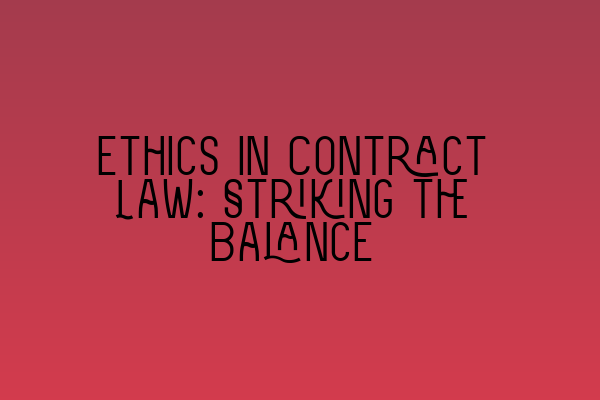Exploring the Impact of Frustration on Contractual Obligations: Legal Insights
Interpreting Contractual Clauses: Unlocking the Hidden Meanings
Legal Aspects of Business Contracts: Key Considerations for Entrepreneurs
SQE Contract Law vs. Traditional Qualifications: A Comparative Analysis
Agreements in Contract Law: Understanding Its Various Types
In the world of contract law, ethics play a crucial role in defining the boundaries of acceptable behavior. While contracts exist to facilitate agreements and promote financial transactions, it is essential to strike the right balance between adhering to legal obligations and ethical considerations. This blog post delves into the realm of ethics in contract law and explores how the legal profession can navigate the complexities that arise.
Understanding the importance of ethics in contract law requires a grasp of the fundamental principles that underpin this area of legal practice. Contracts function as legally binding agreements between parties, outlining their respective rights and obligations. However, the mere existence of a contract does not guarantee ethical behavior. What may be legal may not always be morally right.
One key aspect of ethical contract law involves ensuring that both parties to the agreement have equal bargaining power and understanding of the terms. Transparency and fairness should be at the forefront when negotiating and drafting contracts. A party should not exploit the other’s lack of knowledge or manipulate the terms to gain an unfair advantage.
Moreover, upholding ethical standards means avoiding misleading or deceptive conduct. Parties should provide accurate and complete information to foster informed decision-making. Honesty and integrity are crucial for building trust and maintaining the integrity of contractual relationships.
While ethics guides the behavior of legal professionals, it is essential to acknowledge the potential conflicts between legal obligations and moral principles. A contract may be legally binding, but its terms or performance could be ethically questionable. In such cases, attorneys must be adept at identifying and addressing ethical dilemmas.
The Role of Ethics in Resolving Contractual Disputes
When contractual disputes arise, ethical considerations come to the forefront. Parties may have differing interpretations of contractual clauses or encounter unexpected circumstances that impact their ability to fulfill their obligations. In these instances, legal professionals must navigate the ethical and moral complexities involved.
Exploring the Impact of Frustration on Contractual Obligations: Legal Insights
Interpreting Contractual Clauses: Unlocking the Hidden Meanings
There are legal mechanisms in place to address such situations, such as the doctrine of frustration. This doctrine comes into play when unforeseen events occur, rendering the performance of the contract impossible or radically different from what was originally contemplated. Understanding the impact of frustration on contractual obligations is essential to ensure fairness and equity in resolving disputes.
Interpreting contractual clauses is another area where ethical considerations come into play. Contracts often contain provisions that may be subject to different interpretations. Legal professionals must approach these clauses with integrity, considering the parties’ intentions and the context of the agreement. This process aims to unlock the hidden meanings and ensure a just and fair outcome.
Legal Aspects of Business Contracts: Key Considerations for Entrepreneurs
SQE Contract Law vs. Traditional Qualifications: A Comparative Analysis
For entrepreneurs and businesses, understanding the legal aspects of business contracts is paramount. It involves not only complying with contractual obligations but also considering the ethical implications of their actions. Being aware of the legal and ethical responsibilities can help entrepreneurs avoid potential pitfalls and build strong, sustainable relationships with their contractual partners.
Comparing the new SQE Contract Law qualification with traditional qualifications also sheds light on the importance of ethics. The SQE qualification aims to incorporate ethical considerations into legal training, ensuring that future legal professionals have a strong foundation in ethical practices. This emphasis on ethics highlights the increasing recognition of the role it plays in contract law.
Agreements in Contract Law: Understanding Its Various Types
To further explore the ethical dimensions of contract law, it is crucial to understand the different types of agreements that exist. From express contracts to implied contracts, each type carries its own set of ethical considerations. Understanding these nuances enables legal professionals to navigate the complexities of contractual relationships while upholding ethical standards.
In conclusion, ethics in contract law is a delicate balancing act. Legal professionals must adhere to the law while also considering the moral and ethical implications of their actions and the terms of the contracts they handle. Striking this balance ensures fairness, integrity, and trust, cementing the foundation of contractual relationships. By exploring the impact of frustration on contractual obligations, interpreting contractual clauses, understanding the legal aspects of business contracts, comparing qualifications, and understanding the various types of agreements, legal professionals can further develop their ethical skills and contribute to a more just and ethical contract law environment.
